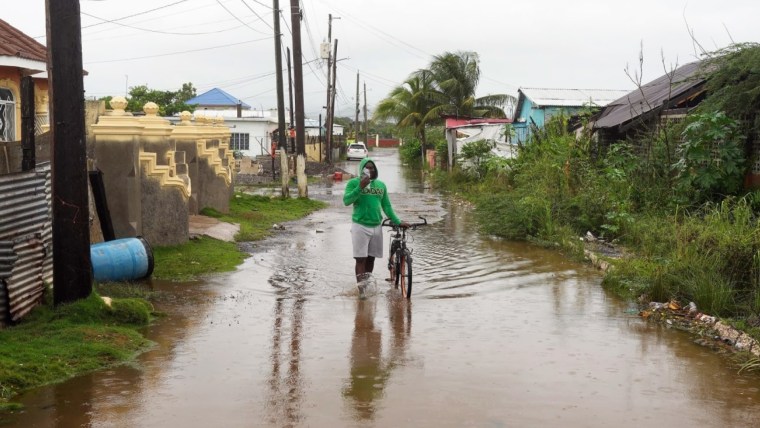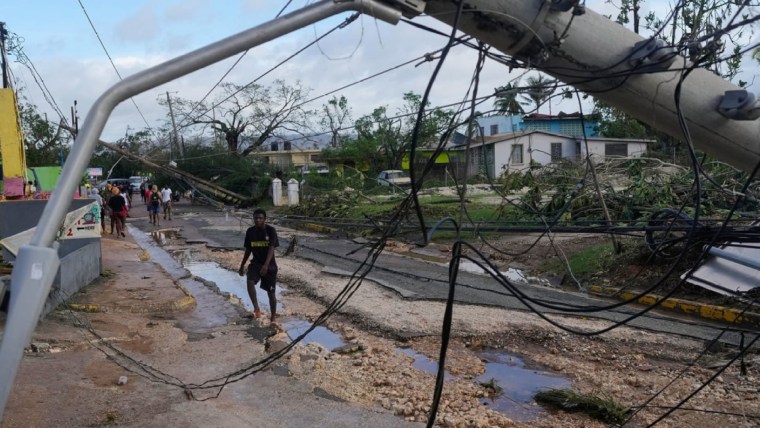As the Category 5 Hurricane Melissa approached Jamaica last week, the anxiety of those who lived here was collective, and we all braced for impact. Thankfully, for those of us who live in the capital city of Kingston, our city was spared the worst of the storm. But on the western part of our island, where the storm made landfall with maximum sustained winds of 185 mph, the parishes of St. Elizabeth and Westmoreland, home to communities such as Treasure Beach and Black River, bore the brunt of the devastation.
Many of us feel like there are now two Jamaicas.
Our feelings after Melissa passed, then, were a mixture of relief and horror: relief that we and our loved ones in the capital were relatively safe, and horror at the destruction in the western parishes. We also understood that our Caribbean neighbors, including Haiti and Cuba, were hit hard as well and endured equal, if not greater, devastation. This shared regional vulnerability underscores how climate change is not confined by borders; it’s a collective Caribbean reality.
Many of us feel like there are now two Jamaicas. As early as last week in the eastern parishes, most businesses were open and services were either restored or being restored. What a contrast that is to entire communities to our west seemingly wiped off the map. Even if we weren’t personally affected, as Jamaicans, we’re mourning the loss of lives, livelihoods and natural treasures. And we know that as the western part of the island suffers, so do we all.
Tourism, fisheries and agriculture are among the hardest hit, but every sector feels the ripple effect because our economy functions as an interconnected ecosystem. St. Elizabeth, often called Jamaica’s breadbasket, is central to this reality. With 29,320 registered farmers — the largest number of any parish — and a contribution of more than 102,000 tons of domestic food crops in 2017, St. Elizabeth’s role in feeding the nation is critical.
When farms in St. Elizabeth are damaged, the effects cascade across the food chain, affecting local markets, restaurants and small businesses like my own, Chilitos JaMexican Restaurant. The health and rehabilitation of our farms are therefore crucial to national food security, economic stability and the long-term survival of small enterprises.

For Jamaicans, hurricanes are not abstract disasters — they’re part of our lived and cultural reality. We grow up understanding what preparedness looks like, from boarding up windows to checking on elders and neighbors. But our approach to hurricane preparedness is not only cultural — it’s also institutional. Our country pioneered a groundbreaking financial tool known as the “cat-in-a-grid” catastrophe bond, the first of its kind in the world. This innovative bond applies our deep experience with hurricanes to economic resilience, creating a fiscal safeguard that releases funds when storms like Melissa reach specific thresholds of intensity. It’s a powerful example of how our resilience and ingenuity are embedded not just in community culture, but also in how we design national policy.
The devastation visited upon our nation’s fisheries and farms makes those bonds even more significant now. They represent not only a fiscal safety net, but also a lifeline for recovery. I look forward to seeing how those funds will be allocated, and I believe the onus is on our government to ensure that this support reaches the communities and industries most in need.
Our region contributes only a tiny fraction of global emissions, yet we face the harshest consequences.
At Chilitos, in the wake of this disaster, we’ve launched an initiative to raise awareness for blood donations. We’re offering discounts to anyone who donates blood as a small way to encourage community support and help address the urgent need for blood across Jamaica.
Beyond the immediate recovery lies a broader truth: The Caribbean bears a disproportionate burden in the global climate crisis. Our region contributes only a tiny fraction of global emissions, yet we face the harshest consequences, from intensified storms to eroding coastlines. While Jamaica and other small island nations make every effort to adapt, powerful countries continue to stall global action. For example, the U.S. recently blocked a United Nations proposal to tighten emission standards for shipping, a move directly opposed to the interests of small island nations like ours. Meanwhile, U.S. warships patrol Caribbean waters, a reminder that global inequities extend far beyond economics.
The world must confront not only the science of climate change, but also the politics and histories that shape it. Jamaica and other small island developing states are doing what we can — strengthening disaster response, deconstructing the legacies of colonization that have historically limited our ability to protect our resources and building more resilient infrastructure. We are already doing the hard work of reimagining what sustainability looks like from the ground up. But we cannot offset the actions of industrial nations that continue to profit from pollution at our expense.
As one Jamaican saying goes, “Wi likkle but wi tallawah.” We are small, but we are strong. Our resilience is our inheritance, but it should not have to be our only defense.
